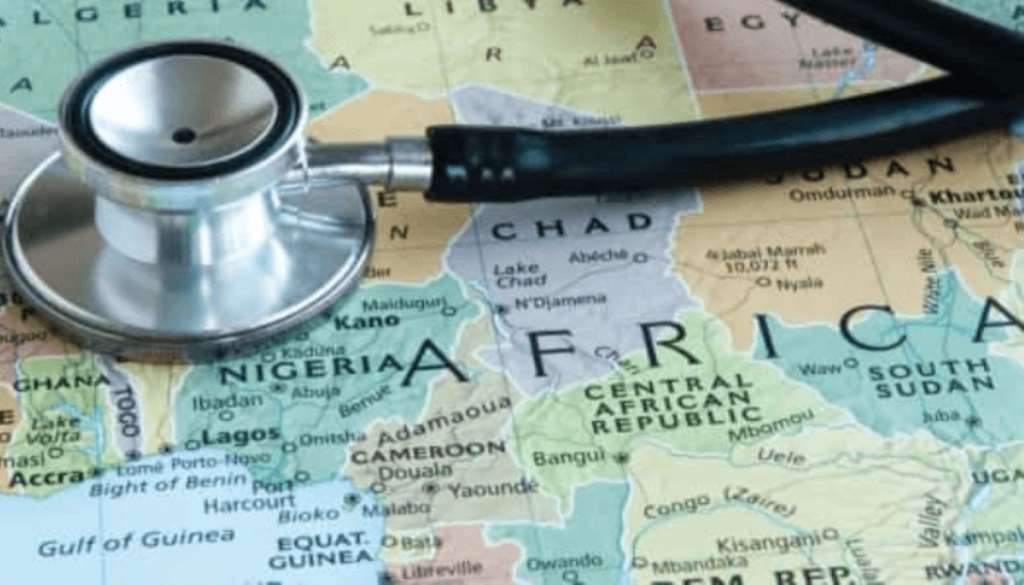Health workers’ migration has been an important issue in Nigeria. These migrations of health workers continue to deepen as a result of educational and management issues, better career opportunities abroad, insecurity, lack of investment in medical equipment, poor salaries, and irregular payments, amongst others, making Nigeria one of the 55 countries with a severe shortage of health workers.
Nigeria’s health minister recently revealed that about 67 percent of Nigerian doctors migrating abroad practice in the United Kingdom. The country now has only 55,000 licensed doctors to serve its growing population of over 200 million.
With 0.363 medical doctors per 1,000 people, far below the WHO recommendation of 4.45 per 1,000 population, Nigeria has continued to lose even more, and the uneven distribution in the ratio of doctors to population is worsening.
The United Kingdom (UK) National Statistics reveal that in 2021, 4,087 healthcare workers migrated to the UK. In 2022, this number increased to 11,629, and it further rose to 26,074 in 2023, raising concerns.
In a report published in March of 2023, the World Health Organization (WHO) warned that by 2030, there will be a global shortage of 10 million healthcare workers. The shortage will especially affect low-income countries, such as Nigeria, due to workers going abroad in search of opportunities.
Just recently, the Medical and Health Workers Union of Nigeria (MHWUN) asked the Kogi State governor, Usman Ododo, to recruit health workers into the various hospitals and primary healthcare centres in the state, decrying the acute shortage of manpower in the health sector.
Efforts to Stem the Migration Tide
On September 9, 2014, Goodluck Jonathan signed the National Health Act 2014. The act provides a framework for the regulation, development, and management of a National Health System. Its overarching objective is the provision of universal health coverage (UHC), providing a framework for improved funding and regulations regarding universal access to health care.
However, Dr. Reinnet Awoh, a health expert, noted that despite this act, the lack of adequate infrastructure and continuous funding resulted in healthcare staff continuing to “suffer difficult working conditions, particularly in rural areas.”
Among these efforts is the National Policy on Health Workforce Migration, approved in August by Bola Tinubu, to ensure that health sector professionals are well-supported, adequately rewarded, and optimally utilized to meet the healthcare needs of Nigerians.
The policy aims to manage the exodus abroad of skilled Nigerian healthcare professionals.
According to the Minister of Health and Social Welfare, Prof. Muhammad Ali Pate, “This policy is more than just a response to the ongoing exodus of healthcare professionals; it’s a comprehensive strategy to manage, harness, and reverse health worker migration.
“It envisions a thriving workforce that is well-supported, adequately rewarded, and optimally utilized to meet the healthcare needs of all Nigerians,” he said.
The major parts of the policy include incentives for health workers, safety and security for health workers, jobs for returnees, data collection, capacity development, training programmes, monitoring, and implementation, all targeted towards health workers.
“The National Policy on Health Workforce Migration is the most direct and comprehensive so far,” continued Dr. Awoh.
According to him, efforts should not just focus on trying to keep health workers in Nigeria, but on ensuring these workers are motivated to stay by improving their working conditions.
“The focus on providing incentives, especially for those working in rural and underserved areas, is spot on. These regions are usually the hardest hit by the shortage of health workers, and offering competitive benefits is key to making those areas more appealing.
“The emphasis on capacity building is another major win. Healthcare is evolving quickly, and our workers need to be kept up to date, especially with digital health technologies like telehealth and Electronic Medical Records (EMR). This isn’t just a luxury; it’s essential if we want to keep pace with global healthcare standards and improve access to care, particularly in remote areas,” he said.
Awoh emphasized that creating a system that makes it easier for skilled workers abroad, who have gained valuable experience, to return and contribute to strengthening the health sector is a smart move. However, he added that its success depends on how the policy is implemented.
Practical Solutions To Health workers migration
Dr. Awoh said that to solve the problem of health worker migration, both short- and long-term efforts should be made.
He opined that improving the working conditions of health workers and offering real incentives such as bonuses, housing, or allowances for those in rural areas can make those positions more attractive.
“Healthcare workers also need financial security, so expanding health insurance and providing social safety nets can help reduce uncertainty. Simplifying the process for Nigerian healthcare professionals abroad to return, along with offering competitive packages like leadership roles or housing, is another quick solution.
“Finally, mental health support and improved work-life balance are crucial. Offering measures like mental health services, reducing work hours, and providing more breaks can help prevent burnout and retain healthcare workers,” he said.
According to him, long-term interventions will require creating a National Health Workforce Registry to help track healthcare workers, identify shortages, and plan for future needs; investing in digital health technologies like telemedicine and Electronic Medical Records; and establishing public-private partnerships to train healthcare professionals for both domestic needs and international markets, ensuring enough skilled workers remain at home.
